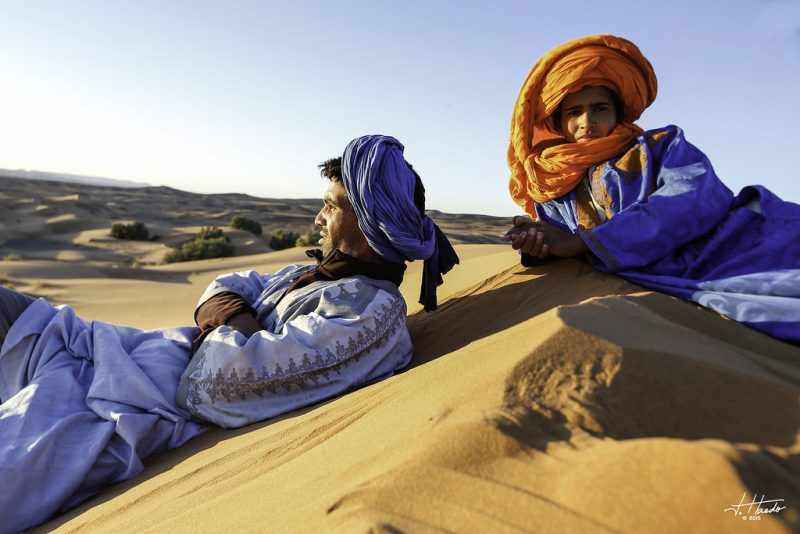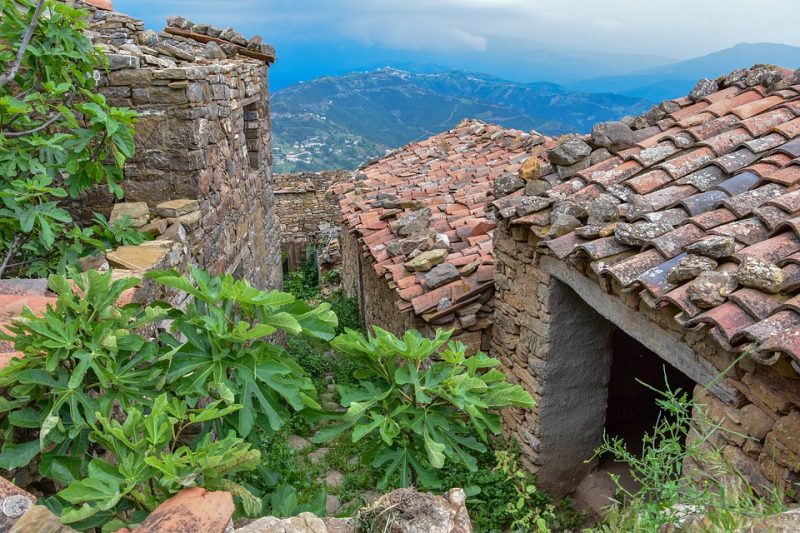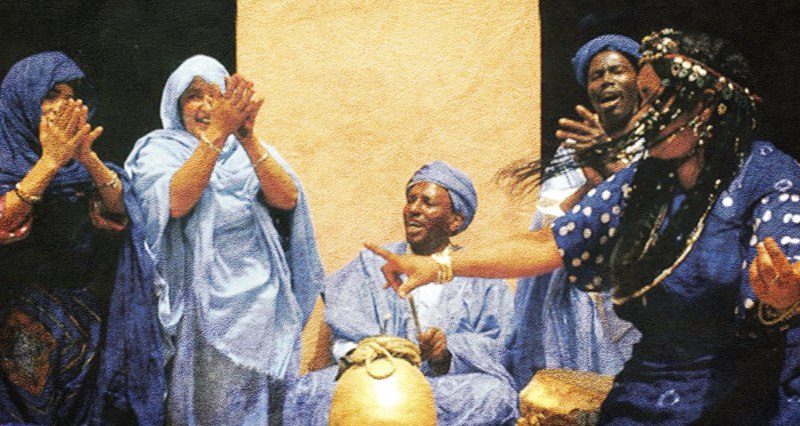The Berber population of northern Africa, as I discussed in the first part of this article, is estimated at around 50 million people. The group factors heavily into a number of armed conflicts in the region and has recently begun to manifest as a factor in the activities of political movements and NGOs.
Berber Spring 2.0
During the events of the Arab spring of 2011, Berber flags began to appear at protests in North African countries. The constitution of 2011, adopted as a result of protests in Morocco, officially recognized the Amazigh language. That same year in Algeria, the Berber language was recognized as the national language, and in 2016, it received official status.
In Libya, the overthrow of Muammar Gaddafi’s government resulted in a civil war. However, the Amazigh people (the Imazighen) took advantage of the instability of the state and achieved relative autonomy. In contrast to the Tuaregs of the south who were a bastion of support for Gaddafi and his relatives, the Imazighen of Libyan North actively participated in the pro-Western rebellion. The offensive that eventually captured Tripoli started in the Berber Nafusa Mountains.
In the municipalities now under their control (Zuweira and Nafusa mountains) the local Berber dialect is being taught in schools. Tamazight inscriptions can be seen throughout Berber settlements.
In 2016-2017, protests swept the Rif region of Morocco led by the Hirak Rif movement. Participants in these protests said they opposed corruption, the arbitrariness of the authorities and high unemployment rates. They also criticized the central authorities for neglecting the region’s problems. Interestingly, Rif is a prominent area for the illegal growth of marijuana, which is then exported to Europe. However, contrary to the aspirations of local drug producers, the Moroccan authorities are in no hurry to legalize their business.
It is significant that during the protests that gripped Rif at that time, protesters were seen waving the flag of the independent Republic of the Rif, which existed between 1921 and 1926.
During the protests that swept Algeria in 2019, eventually leading to the resignation of President Abdul Aziz Bouteflika, Berber flags came to the fore again. The then head of the General Staff of the Algerian Army General, Gaid Salah (who de-facto ruled the country until his death on December 23, 2019) had banned the public use of these symbols.
Thus, since 2011, the Berber factor has become more relevant in the political life of North Africa. Berber flags have become a significant symbol of protests. The movements associated with the “Arab Spring” have a distinct Berber dimension. However it should be noted that the region had previously witnessed many purely Berber protests, one which took place in Algeria in 1980 which was called “the Berber Spring.”
Creating “the Berbers”
The Berber flag mentioned above is actually a rather recent invention. It was created by Mohand Arav Bessaoud, a Kabyle Algerian activist who fought against French colonialism, but later emigrated to France after Algeria achieved independence. It was in France in the 1960s that he laid the foundation for the “Berberism” (Dda Moh) movement, which advocated for the advancement of the Berber identity and the self-determination of Amazigh people. The name “Amazigh” (free man) is also a recent invention. It was created from one of the Berber languages but not used as a unifying name by Berber tribes until quite recently.
It was also in France that the first organization appeared claiming to speak on behalf of all Amazigh people and calling for an Amazigh World Congress. In the struggle for the rights of Berbers, immigrants from Algeria were actively supported by Jacques Bénet, a former French colonial official. Wikileaks published a variety of materials including US State Department correspondances from 1976, wherein Jacques Bénet is listed as French special services officer. In one document he is associated with a series of explosions at Algerian consulates in France.

Public domain pictures
The Berber Academy founded with his support in Paris set about standardizing the Berber alphabet. His activities and those of related emigre circles can be seen as efforts in nation-building: an attempt to create an “imagined community” of an Amazigh nation from a variety of nationalities and Berber tribes of North Africa, united by common political symbols. From the very beginning, this new nation was opposed to the authorities of the North African countries where Arab nationalism dominated. The “Berber project” was supervised from the capital of the former colonial metropolis – Paris.
As Ramzi Rouighi, the author of the book “Inventing the Berbers: History and Ideology in the Maghrib”, has noted, during the colonial rule of France in Algeria and Tunisia (and later in Morocco), the French began to instrumentalize separation of Arabs and Berbers in their colonies, using the classic Roman strategy of “divide and conquer.”
The Berbers began to be associated with certain characteristics that separated them from the Arabs. In particular, they were considered “white,” and therefore, more prone to assimilation into European culture.
This colonial construct laid the foundation for the ideology of Berberism which was developed during the 20th century, mainly among emigrants from North African countries.
Imazighen politics
With respect to the participation of Berbers in the politics of Maghreb countries, Mauritania cannot be included. In Mauritania, the most archaic systems of social relations have been preserved and ancient tribal traditions are combined with the absolute dominance of army elite. However, it is worth noting that, since 2019, the head of the country has been General Mohamed Ould Cheikh Mohamed Ahmed Ould Ghazouani, whose father was a Sufi sheikh and the spiritual leader of the Berber Ideiboussat tribe, which, according to experts is “a tribe of great significance, and, thanks to their ties to Sufi-mysticism and trade proveniences, they have acquired a powerful but discreet influence in the country.” The president and former army chief of staff have unique knowledge of the Mauritanian tribal landscape, animosities and interdependences which has helped keep Mauritania resistant to the terrorism in the Sahel, despite its “backwardness” from a Western point of view.
The case of Mauritania highlights the role that predominantly Berber Marabout tribes can play in the geopolitics of Africa. It should be kept in mind that those tribes were also at the center of expansion of Sufi tarikats Qadiriyya and Tijaniyya among the African population.
In Algeria, several distinct Amazigh political structures already exist with a legal basis: there is the Socialist Forces Front (formally internationalist, but supported by many Berbers), and Rally for Culture and Democracy which is supported by the Algerian Kabyle party (liberal). There is also a prominent separatist movement, the Movement for the self-determination of Kabylie, which is fighting for the creation of a Kabyle State.
In 2016, the movement merged with the Provisional Kabyle Government (GPK), a self- proclaimed government which formed in Paris. Information has come out which shows that the GPK receives support from Morocco.
The Arouch Movement is another Kabyle movement in Algeria which fights for Berber rights and self-determination. After the “Black Spring” in Algeria in 2001, a small region of Barbacha in Kabylie reached a de-facto self-governance. It is interesting to take note of the fact that this de-facto separatism has attracted the attention of a number of European left-wing activists.
In Morocco, the Parti écologiste marocain – Izigzawen of Amazighs was banned in 2007 and then dissolved. The Berber population of the country supports the Popular Movement, which focuses on rural residents and advocates for the monarchy. However, this party is a member of the Liberal International. At the same time, the Berber movement is perceived in part as a counterweight to the Islamists. The Islamists see the movement for the revival of the Berber identity secular and directed against Islam.

Pixabay
Morocco’s activity during the Amazigh World Assembly (AMA) is also telling. This structure was separated from the World Amazigh Congress in the 2000s. It is currently led by Rachid Raha, a citizen of Spain and Morocco. At the same time, the assembly is registered as an NGO in Bruxelles, Belgium.
This organization stands for the autonomy of Berber regions throughout North Africa. In 2011, the Tamazgha project was announced and described as “a Confederation of Federal States of North Africa,” which would be based on the Berber identity.
The organization maintains links with the leftist movements of Spain (Podemos), Catalan and Kurdish separatists.
In October 2019, the Amazigh World Assembly condemned the Turkish operation Source of Peace in Syria, accusing Ankara of wanting to “exterminate” the Kurds. https://en.yabiladi.com/articles/details/84531/morocco-s-amazigh-accuse-turkey-wanting.html
In January 2020, the AMA sharply criticized agreements between the government of Fayez Sarraj and Turkey. The organization opposes Turkish military intervention in Libya and sharply criticizes the Muslim Brotherhood, which includes the Justice and Development Party in Morocco. At the same time, the AMA criticizes General Khalifa Haftar for his connections with Saudi Arabia and the UAE.
Another organization claiming to represent the interests of the Berbers is the Amazigh World Congress (headquartered in Paris). The congress calls for “an end to foreign interference and the putting of civilian populations under international protection” in Libya.
The Amazigh’s political structures include the Amazigh Supreme Council (ASC), which is led by Fathi Ben Khalifa. He is a former dissident who has long lived in Morocco and the Netherlands (although he received his education in Russia). Between 2011-2014, Khalifa was the head of the World Amazigh Congress.
In the context of the current conflict in Libya, Libyan Amazigh political forces generally support the Government of National Accord in Tripoli and criticize General Khalifa Haftar. However, they perceive the GNA as a lesser evil rather than an ally and accuse it of inattention to Berber national identity.
At the same time, it is significant that Libu maintains contacts with the separatist movement MLNA in Mali. Last December, Fathi Ben Khalifa spoke at their conference in Kidal.
كلمة فتحي خليفة في مؤتمر الحركة الوطنية لتحرير ازواد #MNLAتصوير الإعلامي بكاي
Ahmed Nasser Azawadien paylaştı: 6 Aralık 2019 Cuma
In January, Libu hosted specialists from the Democratic Institute for International Affairs, an organization created by the United States Government and funded by the National Endowment for Democracy (NED) to promote democracy in developing countries. It is led by former US State Secretary Madeleine Albright.
External interests
From 2012 to 2019, the National Endowment for Democracy also worked with the Berbers in Libya within the framework of the “Libya elections and governance support program.” In the brochure for this program it says that “the NDI works with historically marginalized groups, including women, young people and ethnic minorities who are organizing to increase representation in Libyan politics.” Among the program’s achievements (as noted on the site of the USAID which supported the program) is the organization of “a meeting of 25 representatives of Libyan Tebu and Amazigh communities to identify common advocacy issues and areas of mutual support between the communities.”
In the city of Zuwarah, where the Libu party is based, the Apuleius Foundation also operates. The foundation is a libertarian think tank associated with Fathi Ben Khalifa. Between 2018-2019 it actively collaborated with the German “Friedrich Naumann Foundation for Freedom.”
Our participation in the International Academy of Leadership in Germany, with our partners @FNFreiheit, in a 2 weeks seminar on Moderation: Facilitattion and Program Design. Through our Tripoli office manager Mohamed Hamid, who will work on transferring what he gained to Libya. pic.twitter.com/KDxUTJY85X
— Apuleius Foundation (@ApuleiusF) March 24, 2019
The same German foundation sponsored the 8th General Assembly of the Amazigh World in Morocco in 2018. The event was held by the Amazigh World Assembly (AMA).
The Franco-Swiss organization Médecins sans frontières also claims to work with the Berber communities in Libya.
In September 2019, the Times of Israel reported on how Israeli “activists” were helping Berber communities in Morocco. It is interesting that although aid is described as a private initiative by “Martha Rettig, a retired American-Israeli tour guide,” the article says an Israeli found one of the recipients of assistance through a Facebook page dedicated to indigenous groups in the Middle East and North Africa.
The authors of the material believe that the Amazigh movement can generally be characterized as pro-Israel: “Within that movement, many identify with the modern State of Israel and the Jews, whom they see as having faced – and won – their own struggle to live independently in their ancestral homeland.”
According to Bruce Maddy-Weitzman, Principal Research Fellow at the Moshe Dayan Center for Middle Eastern and African Studies at Tel Aviv University, Moroccan Berber activists are very interested in “the alleged historic connections between Jews and Berbers in ancient times, including the initial resistance to Arab conquerors by the Kahina, a supposedly Jewish-Berber queen, and the multilayered, more recent relations existing until the mass departure of Jews for Israel in the 1950s and 1960s from Berber villages and towns.”
The author admits that a key Israeli Institute for the Study of the Holocaust, Yad Vashem, recently “became a more explicit site for Berber activism against the prevailing pan-Arab and Islamist currents in their own society.” In other words, the Israeli analyst considers the Berber movement an ally of Israel in the region.
In 2011, the same author wrote an article entitled “the Berber Awakening” for the neoconservative magazine “the American Interest.” He noted that “the overarching movement discourse is profoundly sympathetic to Western liberal-Humanist values and Strongly condemns the predominant North African cultural and political order, the which prioritizes Islam and Arab identity.” Therefore “Amazighité represents a bulwark against the spread of Islamist influence.”
According to Bruce Maddy-Weitzman, despite the fact that separatist ideas are not supported by the majority of Amazighs “the Catalans serve as the ultimate exemplar for the Amazigh movement, and the Catalan government provides funding for Amazigh activities.”
Interestingly, the Berber movement is actively supported by the portal https://www.nationalia.info/ , which is itself sponsored by the La Caixa Foundation. This fund, which is associated with one of the largest banks in Spain, has had previous relations with both the Soros networks and the Government of Catalonia.
Under Muammar Gaddafi in 2011, the Libyan External Security Agency accused Mossad of “attempts to break the territorial unity of Algeria, Libya and Tunisia” using Amazigh movements. http://www.amazighworld.org/eng/news/ index_show.php? id = 98
Conclusions:
The Amazigh factor in the geopolitics of North Africa attracts the active attention of Western countries, including the US, France, Germany and Israel. They, alongside westernized Berber intellectuals (especially those in emigration), are trying to use the indigenous people of Africa for the promotion of Western liberal values by dividing Berbers and Arabs. This policy inherits the perception of the Berbers within the framework of the colonialist racist discourse as “white,” and therefore more susceptible to Western civilization than the Arabs. The Imazighen themselves have Western concepts of human rights and feminism imposed on them under the auspice that these principles correspond to the ethnic group’s ‘true’ traditions.
This construction of this new identity has specific political goals: the destruction of Arab and wider Muslim unity in matters relating to Israel, pitting various groups of people in North African countries against each other, fomenting protests in the region, justifying foreign interference in the regions of conflict and using a controlled chaos strategy to control North Africa.
However, it must be said that marginalizing Amazighs within Pan-Arab nationalist discourse in North Africa only contributes to the success of Western efforts.
To strengthen security in the countries of North Africa, it is vital that forms of opposition to Western strategies be developed beyond those that rely exclusively on Arab nationalism. New inclusive formats need to be created that take into account the ethnic diversity and identity of the region, the interests and identity of the Amazigh peoples, Sufi traditions and the complex relations between tribes, clans and castes in North African Societies.









Leave a Reply